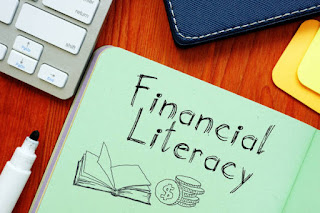YOUR COMPLETE MONEY MASTERY BLUEPRINT: FINANCIAL LITERACY FOR TEENAGERS (2ND PART)
Introduction
Welcome back, in our last post we discussed the first 5 points on your Complete Mastery Blueprint:Financial Literacy for Teenagers, and we would be discussing the remaining 5 points today.
We hope you and your teenagers learned a lot from the last post. fasten your belt and let's enjoy the ride together.
5 FUNDAMENTALS OF FINANCIAL LITERACY FOR TEENS
1. Explain compound interest to them
Our financial system is based on compound interest. Compound interest is one factor that impacts the values of loans and investments on the other side of the horizon. Making sure they comprehend it doesn't just mean teaching them how to calculate compound interest.
Young children can be helped to grasp compound interest by using real-world scenarios in which they are either directly or indirectly involved. For instance, if you own dividend stocks in your portfolio, you may demonstrate to them the benefits of reinvesting dividends to increase the investment's growth rate over time. You can also show them the negative effects of compound interest by using credit card invoices to highlight how quickly their debt will grow due to credit card interest.
2. Discuss Taxes
Your young child will need to pay taxes if they are doing any side work or freelancing. Even if they do not owe taxes right now, they eventually will. You must start talking to them about taxes right away. Nevertheless, make sure your talks are informal and devoid of taxed language.
Those sporadic tax discussions will aid in their comprehension of terms like tax refund vs. tax liability and the differences between various tax forms. This steady education in taxes will be very beneficial, particularly when they have to submit their first tax return.
3. Aid Them in Beginning a Budget
Encourage your teen to participate in home budgeting. They may find this procedure to be more engaging and intriguing by using budgeting apps. Allow them to make the household budget for one month or assist them in putting together their fundamental budget.
Avoid giving them too much advice and let them make their own financial decisions. Even if they are unable to cover all of their expenses with their available income, they will gain valuable budgeting skills and learn how to balance their spending, income, and savings.
4. Offer Advice on How to Make Money.
It is advantageous to have a mind that is focused on earning money. Many parents still dislike this quality in their children, though. If you include yourself in this group of parents, you must dispel the myth that trying to raise a good person would result in an evil child.
The majority of lawful income options are real jobs. Therefore, there is no danger in encouraging your children to exhibit and act on this tendency.
During various academic breaks, young people have a lot of free time, and the best use of this time is to learn how to make money. By learning about many ways to gain money, including stock, bond, micro, real estate, and other investment opportunities, teens may make the most of their free time.
When combined with an entrepreneurial attitude, early investments are the key to building wealth, and they will put your child up for success in life.
5. Permit Failure
Last but not least, you must teach your teenagers that it is acceptable to make poor financial decisions as long as they can analyze the mistake and revise their preventative measures. In reality, they will learn a valuable lesson about money from failure that will stick with them and serve as a guide for the rest of their lives.
Of course, you should do your best to guide your children, but sometimes the best teacher is just experience. Allow them to fail, but be careful not to adopt a "told you so" mentality; if you do, they might refuse to listen to you in the future, even if you are correct.
In Conclusions
As you can see, raising your teens' financial literacy requires strong modeling of important financial skills as well as progressive learning through everyday activities. It is not "do as I say, not as I do," nor is it a crash course that ends after a few weeks.
These financial literacy pointers are intended to assist you in pointing your teenagers the on correct path and p videvidem with a strong financial foundation for their future.
Don't forget to visit our main school website on : www.jacobsschools.com.ng for appetizing information, pictures, and the likes about Jacob's Schools.
Don't limit yourself to these tips alone. Visit our school blog to read more about other related posts at www.jacobsschlsblog.com.ng









Comments
Post a Comment